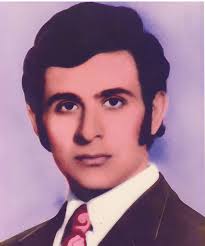Birth of Stepan Zatikian (June 20, 1946)

Stepan Zatikian was one of the pioneers of the Armenian dissident movement in the former Soviet Union and a victim of it.
Zatikian was born on June 20, 1946, in Yerevan to a family of craftsmen. He studied at the Mikayel Nalbandian school in Yerevan, graduating in 1963 with a gold medal. In the same year he entered the Faculty of Chemistry of the Yerevan Polytechnic Institute (now State Engineering University of Armenia). His life was marked by the unprecedented mass demonstration on April 24, 1965, on the fiftieth anniversary of the Armenian Genocide. The next day Zatikian went to the city pantheon to lay flowers at the grave of Gomidas Vartabed. He was arrested near the grave and detained for fifteen days. There he met Haykaz Khachatrian, who was also arrested near Komitas’s grave.
Zatikian and Khachatrian, along with student Shahen Harutunian, formed the National United Party (NUP) on April 24, 1966. The organization was headed by Khachatrian and Zatikian was among the members of the General Council, the governing body. He also wrote the texts of the charter and the action plan of the NUP.
In October 1967, the NUP distributed the first issue of the clandestine newspaper Paros, edited by Zatikian. The newspaper was banned, and its readers persecuted. The NUP managed to publish just two issues of the newspaper.
The arrests of NUP leaders began on July 9, 1968; Stepan Zatikian was a fifth-year student at the time. He was charged with anti-Soviet agitation and participation in an anti–Soviet organization.
The Supreme Court of the Armenian SSR sentenced him to four years in a correctional labor colony. His first years of imprisonment were spent in the political camp of Mordovia. After going on a six-day hunger strike in July 1970 with twenty young political prisoners, he was sent to Vladimir prison. Here he also went on a hunger strike in November 1971. He was released at the end of his term in 1972 and placed under administrative supervision.
After the end of his term, Zatikian was released and placed under administrative supervision. He worked at the Yerevan Electromechanical Plant as a transformer assembler. He did not participate in social activities, considering emigration to be the most reasonable way out for himself and for other Armenians who had served their sentences. In 1974, Zatikyan married Sona Hayrikian, sister of another NUP member, the foremost dissident Paruyr Hayrikian. They had two children who currently reside in the United States.
In 1975, Zatikyan sent a statement to the Supreme Soviet in which he renounced Soviet citizenship and asked to be given the opportunity to leave for any non-socialist country. However, he did not receive an answer.
On January 8, 1977, an explosion in the Moscow metro reportedly killed seven people and injuring thirty-seven others. The following day, dissident academic and human rights defender Andrei Sakharov expressed his suspicions that the incident might have been organized by the KGB to be used against members of a dissident movement. From the point of view of the KGB, it was logical to target Armenia, the only Soviet republic where there was a party that advocated leaving the Soviet Union. This helped discredit the Armenian movement within and without the USSR by presenting it as a terrorist force.
On October 28, 1977, Stepan Zatikian, Hakob Stepanian, and Zaven Baghdasarian were arrested on charges of having carried out the explosion and Zatikian was singled out as the organizer. The preliminary investigation and the trial, in January 1979, were held in top secret conditions; even the relatives of the defendants were not present at the sentencing on January 24, 1979, when the death sentence was announced on January 24. The three young Armenians were shot on January 29. During a meeting with his family after the verdict, the only one from the moment of his arrest, Zatikian’s brother took him aside from his mother and wife and asked if he was guilty of a crime. He replied: “․․․I’m not guilty of anything, except for making orphans of my children.․․” On February 1, the Moscow Helsinki Group’s Document No. 81 questioned the legality and impartiality of the verdict due to the absence of the public.
The documentation of the “Metro case,” as it was known, was not released and remains in the archives of the KGB. Zatikian has not been rehabilitated after the collapse of the Soviet Union and the independence of Armenia.
